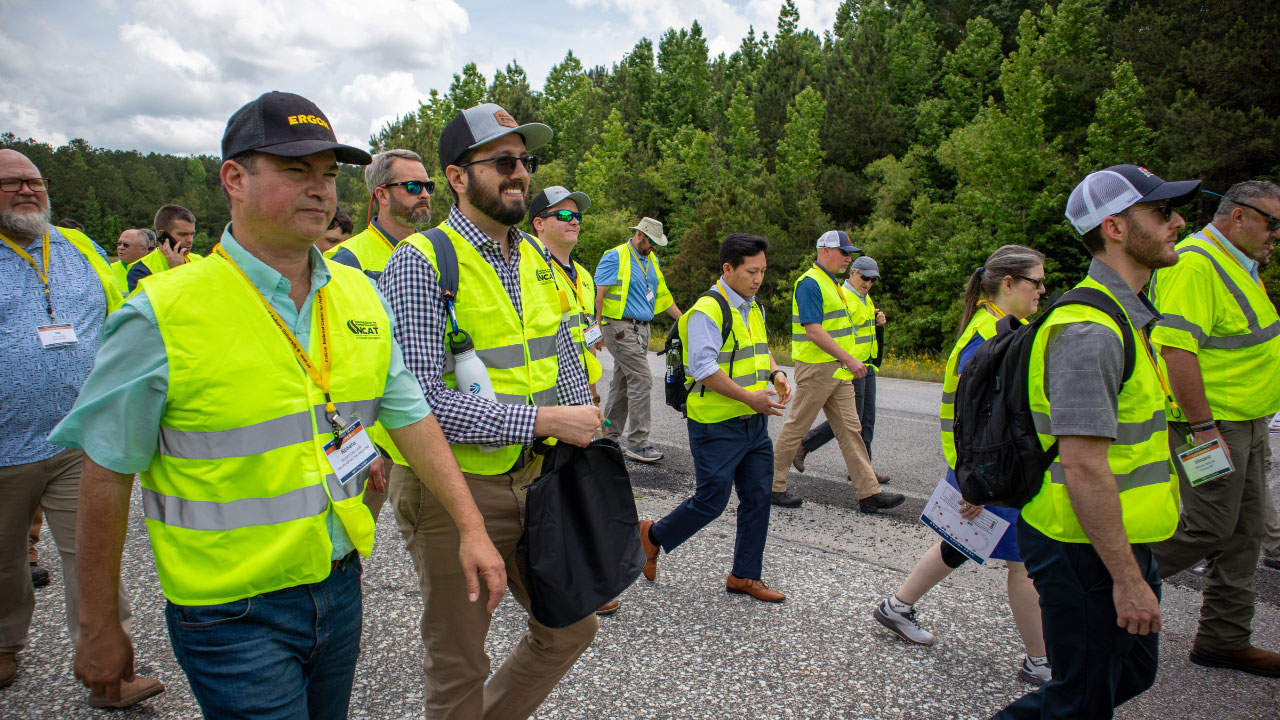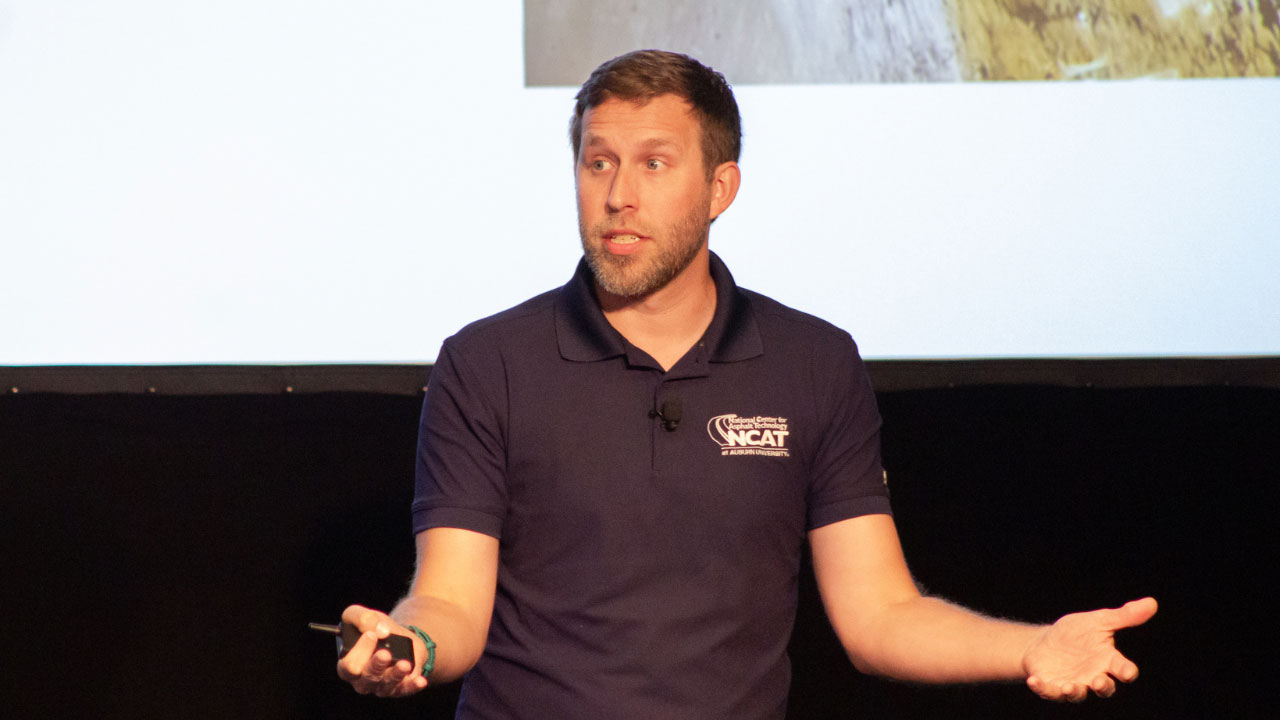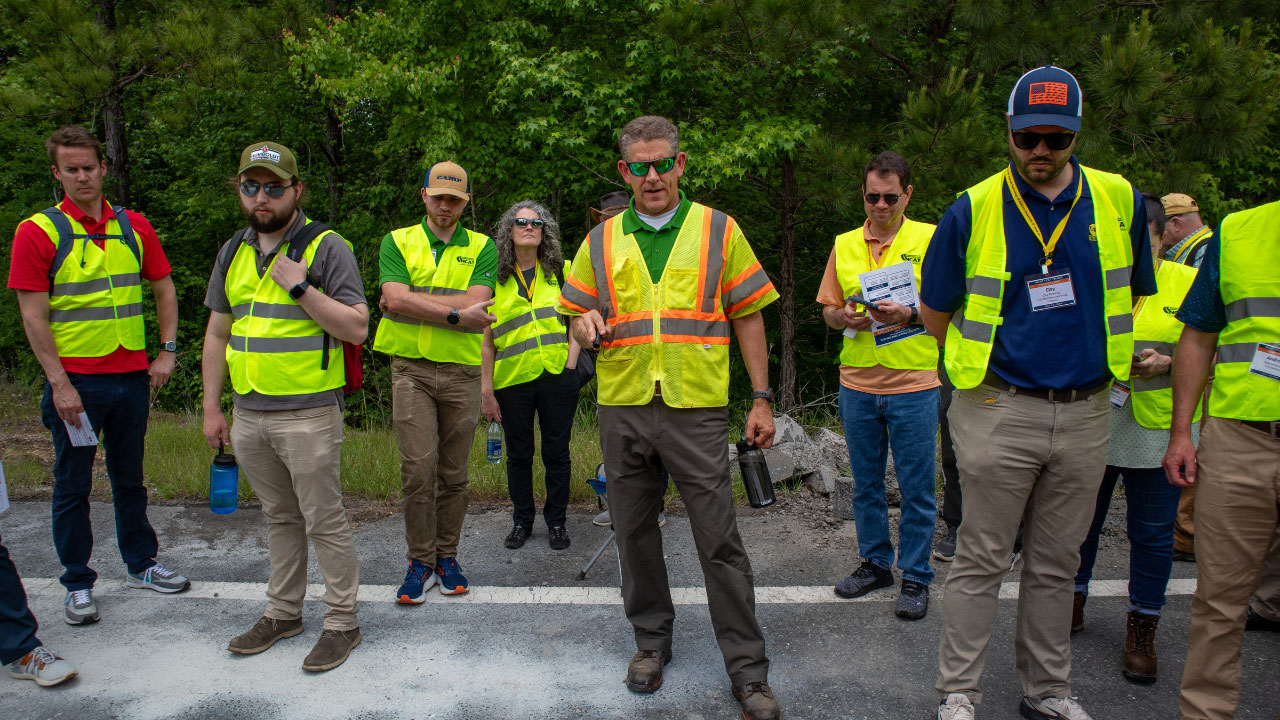- Spring 2024
Driving innovation: NCAT's triennial Test Track Conference attracts asphalt industry leaders
The National Center for Asphalt Technology (NCAT) hosted its triennial Test Track Conference May 7-9 at the Auburn University Hotel and Conference Center. The event presented advancements in the design, construction, materials, maintenance and sustainability of asphalt pavements to over 300 industry professionals.
Highlighting the latest findings from the 8th cycle of accelerated pavement testing conducted at NCAT's Test Track, situated just 20 minutes east of Auburn University, the conference offered insights into the forefront of asphalt pavement research and development.

Asphalt industry professionals and attendees during the tour of NCAT's Test Track at the 2024 conference.
Setting the Tone
"Research means nothing if we do not implement," remarked Richard Willis, National Asphalt Pavement Association’s (NAPA) vice president of engineering, research and technology, setting the tone for the conference in his opening address. The conference encouraged participants to move beyond exploration and actively implement proven technologies—a sentiment that echoed throughout the event.
With attendees from across the country and beyond, including representatives from Hawaii, Peru, Puerto Rico and Saudi Arabia, the conference served as a platform for knowledge exchange and networking within the asphalt industry. Among the participants were research sponsors, public agencies, contractors, asphalt paving associations, FHWA and various other asphalt professionals.

Participants at the Test Track Conference listen to Fan Yin's presentation.
“...the presentations revealed the depth, breadth and vastness of the different test sections/projects, the detailed and precise research parameters and the shared cooperation among so many different state and private organizations for a common and necessary goal were all so amazing,” stated Andre’ Jenkins Sr., assistant bureau chief, research at Alabama Department of Transportation. “The details of the presentations really impressed me. The NCAT staff were seamless and cooperative with everyone and everything that me, as an attendee, felt welcome and warm, just like I feel being a part of the Auburn family whenever I am on campus.”
Paving the Way
Throughout the conference, attendees explored a myriad of topics, spanning from mixture additives to innovative pavement design methodologies. Research engineers from NCAT delivered presentations on recycling agents, innovative mix additives, crack prevention interlayer strategies, high polymer binders, cold recycling, pavement preservation treatments and more.
Benjamin Bowers, assistant professor in the department of civil and environmental engineering at Auburn University and an NCAT researcher presented engaging information on cold recycling, balanced mix design and Life Cycle Assessments of asphalt pavements.

Ben Bowers presenting at NCAT’s Test Track Conference
“This conference brings together all walks of asphalt-life, from agencies to industry, to hear about the research we’ve been conducting and discuss implementable outcomes,” Bowers said. “I love that I now get to stand on stage as an Auburn University and NCAT representative to talk about the impactful work my team is doing for VDOT, TDOT, FHWA and our industry partners. I love the energy that the conference brings along with the community.”
Test Track Tour
A highlight of the conference was the opportunity for participants to inspect the 1.7-mile test track, which features 46 200-foot test sections funded by highway agencies and industry sponsors.
NCAT operates five semi-tractor trailers on the test track for 16 hours a day, five days a week to reproduce similar traffic levels and stress a typical interstate highway would experience in 5 to 7 years, or 10 million equivalent single axle loads (ESALs).

David Timm, an NCAT researcher and Brasfield & Gorrie Professor in Auburn University's department of civil and environmental engineering, addresses Test Track visitors about various sections of the track during the Test Track Conference.
This unique real-world laboratory allows researchers to collect and analyze field performance data, pavement responses and laboratory test results for plant-produced mixtures sampled during construction.
“Being able to see, in-person, how the test sections have performed makes the experiments more meaningful,” said Randy West, director of NCAT. “Conference participants get to see the cracking, feel the textures of the surfaces and see open trenches of sections to observe how damage progresses, is part of the experience that makes this conference unique.”
Road To Progress
Since its inception in 2000, the test track has been instrumental in assisting agencies in refining asphalt pavement specifications and shaping mix design policies. The research conducted at the test track continues to yield dividends for many agencies.
With its unique ability to simultaneously test multiple instrumented asphalt pavements under natural environmental conditions with accelerated loading, the Test Track stands as a beacon of innovation and excellence in asphalt research.

NCAT Test Track Section
Established in 1986 through a collaboration between Auburn University and the National Asphalt Pavement Association’s Research and Education Foundation, NCAT was founded to address the needs of maintaining America's pavement infrastructure through practical research and development initiatives. The center’s mission is to provide innovative, relevant and implementable research, technology development and education that advances safe, durable and sustainable asphalt pavements.